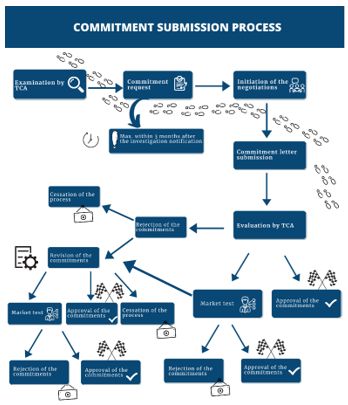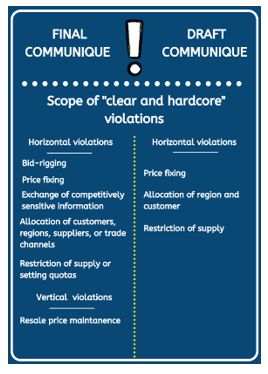Significant changes have been made to the Law No. 4054 on Protection of Competition (Turkish Competition Act), by the Law No. 7246, which entered into force in the Official Gazette dated June 24, 2020. Article 43(3) of the new Competition Act stipulated that the procedures and principles relating to the commitment process will be regulated by a communiqué to be issued by the Competition Board (Board). However, after the amendments came into force, many firms applied for commitments and started the relevant processes while secondary legislation had not yet been finalized. All these applications raised discussions particularly about the procedural rules of the commitment mechanism and gave signals for the practice. As a matter of fact, the Board issued its first commitment decision (investigation against undertakings that provide customs temporary storage services1) on November 5, 2020, without completing the preparation of secondary legislation. In addition, in its Arslan Nakliyat decision2 published on 23.11.2020, the position of the Board was revealed towards the implementation of the commitment process in terms of timing for commitment request.
The first step towards the elimination of the legal uncertainties that arise in the absence of secondary legislation was taken when the Draft Communiqué on Commitments Offered During Preliminary Investigations and Investigations on Restrictive Agreements, Concerted Practices, Decisions and Abuse of Dominance (Draft Communiqué) was published on the official website of the Competition Authority (TCA) on 27.11.2020 and opened for public opinion. Following this, the draft communiqué was finalized in accordance with comments and opinions collected from all relevant parties and the final version of the Communiqué (Commitment Communiqué) adopted by the Competition Board on 11.02.2021 and entered into force after its publication in the Official Gazette dated 16.03.2021.
What Is the Scope Of The Commitment Communiqué?
The Commitment Communiqué regulates three issues: (1) Scope, (2) Procedural Rules, and (3) Evaluation Principles of the Board.
In the Commitment Communiqué, "hardcore restrictions" are excluded from the scope of the commitment application.
In the Draft Communiqué, it has been subject to debates when the resale price maintenance, which is a vertical violation considered as a "severe restriction" in the TCA's precedents, is defined as a hard-core restriction. On the other side, the Commitment Communiqué approaches the issue with a different perspective and lists the hardcore violations on a numerus clauses basis as follows:
- Price fixing between competitors,
- Allocation of customers, suppliers, regions, or trade channels,
- Restriction of supply or setting quotas,
- Bid-rigging,
- Exchange of competitively sensitive information such as price, production or sales amount that is planned to be implemented in the future
- Determination of the buyer's fixed or minimum sales price in vertical relations (Resale price maintenance - RPM)
The definition of hardcore restrictions is limited to the violations listed above. Accordingly, in principle, all cases concerning the "abuse of dominant position" could benefit from the possibility of commitment.
How the Commitment Process Will Proceed?
According to the Commitment Communiqué, the commitment process is initiated by a written request for initiating the commitment procedure that must be submitted directly to the Authority.
Until when a request for commitment can be submitted?
The parties against whom an examination (preliminary investigation or investigation) is being conducted have to submit their written requests to the Board "within three months from the notification of the investigation report" at the latest. The requests submitted after this period will not be able to trigger the initiation of commitment negotiations.

It is evaluated that the said request does not have to contain a detailed commitment set. In this context, at the first stage, only the timely registration of "a request letter for the initiation of commitment process" to the Authority would be sufficient to initiate the process.
Considering that Article 43(3) of the Competition Act regulates the submission of commitment during preliminary investigation or investigation, we observe that there are no limitations on the initiation of the commitment process. However, the Communiqué limits this period by the secondary legislation and it regulates that the decision of the undertaking to initiate the commitment process must be made no later than 3 months from the notification of the investigation report.
The TCA, which takes into account that the time limit in question can also create problems in terms of ongoing investigations, regulates that such timing requirement will not be applied for the ongoing investigations if the three-months period have already passed as of the date of entry into force of the Communiqué..
At this point, it appears that the Commitment Communiqué differs from the Draft Communiqué. In the Draft Communiqué, it was stated that those who were investigated in such investigations could request to submit commitments until the submission of the third (last) written defense. Nevertheless, there is no such limitation in the finalized and published version of Commitments Communiqué. However, as per the TCA's latest approach, the investigation ends with the third written defense.
Undertakings subject to the examination of the TCA cannot request flexibility for this period. However, the initiation of commitment negotiations may be delayed by the decision of the Competition Board only if (I) competition problems have not been adequately explained and (ii) more detailed examination is needed. No time limit for such a delay is regulated under the Commitments Communiqué.
How the Commitment Negotiations Will Proceed?
After submitting the commitment request to the Authority, the Board has two options: (i) initiating the commitment negotiations or (ii) rejecting the commitment request and ceasing the commitment process. Since a substantial commitment is not required for the request, at this point, the applicability of the request in terms of its subject will be evaluated.
It is specified that the explanations on the competition law issues will be notified and all relevant information and documents will be provided to the parties at the beginning of the negotiations.
However, as per the Commitment Communiqué, relevant information and documents may not be separately provided to the parties if the investigation notification has already been officially served to the parties by the time of the negotiations.
There is no rule governing the scope of negotiation procedure, number of meetings, meeting timings, etc. within the Commitment Communiqué.
What will the Commitment Letter Include?
Parties having an intention to continue with the commitment procedure after the negotiations have to submit (i) a commitment letter (ii) a redacted version of the commitment letter shadowing commercial secrets and proprietary information and (iii) a summary of the redacted letter to the Authority under the period specified by the Authority during the negotiations.
The Authority determines the period provided to the parties to submit the commitment letter following the negotiations. This period will be determined based on (i) the Authority's position in terms of its assessment and (ii) the scope of the commitments.
The Commitment Communiqué provides that the commitment letter will explicitly comprise the commitments. In this scope, it is clearly stated that commitment letters including alternative commitments or pleading in the alternative will not be accepted by the Authority.
In case the commitments require separate agreement with the third parties, the letter has to demonstrate that such agreement can be achieved. While the Draft Communiqué required the parties to show that they are "agreed upon", the Commitment Communiqué rightfully finds it sufficient to show the "possibility" of agreeing.
The Commitment Communiqué does not make a distinction between behavioral and structural commitments. In this scope, these commitments can be submitted individually or together.
The Commitment Communiqué clearly states that the parties' general declarations on complying with the competition law rules are not deemed commitments. In this respect, compliance efforts will continue to be taken into account merely as mitigating factors in the determination of administrative monetary fine.
How the Board Will Assess the Commitments?
The Board will evaluate whether the submitted commitments can eliminate the competition law concerns and other issues deemed necessary.
It should be noted that similar to preconditions to litigation, the Board will primarily evaluate whether the agreement or behavior at hand falls within the scope of the Commitment Communiqué (analysis for clear and hardcore restrictions) prior to the initiation of the commitment negotiations.
After the negotiations, if the Board finds the commitments sufficient, it may decide the following:
- (During the preliminary investigation) Not to launch an investigation by making the commitments binding on the relevant party
- (During the investigation) To cease the ongoing investigation by making the commitments binding on the relevant party
- To request third party opinions about the commitments (Market Test)
If the Board finds the commitments insufficient, it may decide the following:
- To allow the parties to revise their commitments, only once, within the period determined by the Board or
- Cessation of the process.
The decision to provide the parties with the opportunity to revise their commitments completely lies within the discretion of the Board. For this reason, the Board may decide to cease the process without giving such an opportunity.
In the event of the cessation of the process, the parties cannot request to submit another commitment letter.

How to Conduct the Market Test?
It should first be mentioned that, according to the Commitment Communiqué, "Market Test" is not a compulsory procedural step to be followed. However, in case of a decision of the "market test", the Board has to find the commitment letter, which is submitted after the commitment negotiations, sufficient or potentially applicable at the latest.
After the market test, the Board re-assesses its first evaluation on finding the commitment letter "sufficient" and then issues its final decision. In case the Board changes its opinion and finds the commitments insufficient, it may provide the parties with a revision opportunity for once only. Nevertheless, the Board has a full discretion on deciding whether to provide the parties with a revisions opportunity, thus it may also decide to cease the process if deemed necessary.
After the revisions, the Board may conduct a market test again.
The market test can be conducted via official service to the relevant third parties determined by the Board or through an announcement on the TCA's official website. The Board has also full discretion to decide the method.
What Happens When the Parties Intend to Amend Their Commitments?
In case the parties want to change their commitments, the negotiations will be endured and the process of the submission of commitments will exactly be repeated. After revising the commitments, if it deems necessary, the Board may conduct a market test again.
The Legal Nature and the Effect of the Commitment Decision
The Commitment Communiqué provides that the Board's commitment decisions, which makes the commitments binding, do not comprise a finding on whether the agreement, decision, or the conduct constitutes an infringement or not. In other words, when the Board issues a commitment decision, there will be no infringement finding by the TCA and the investigation will be ceased.
Having said that, the Board may still include the competition law concerns it identified during the examination in its reasoned decision to be published on the TCA's official website.
Footnotes
1 The investigation conducted by the Competition Board with its decision dated 24.07.2020 and numbered 20-35/460-M.
2 The decision of the Competition Board dated 28.07.2020 and numbered 20-36/485-212.
The content of this article is intended to provide a general guide to the subject matter. Specialist advice should be sought about your specific circumstances.


